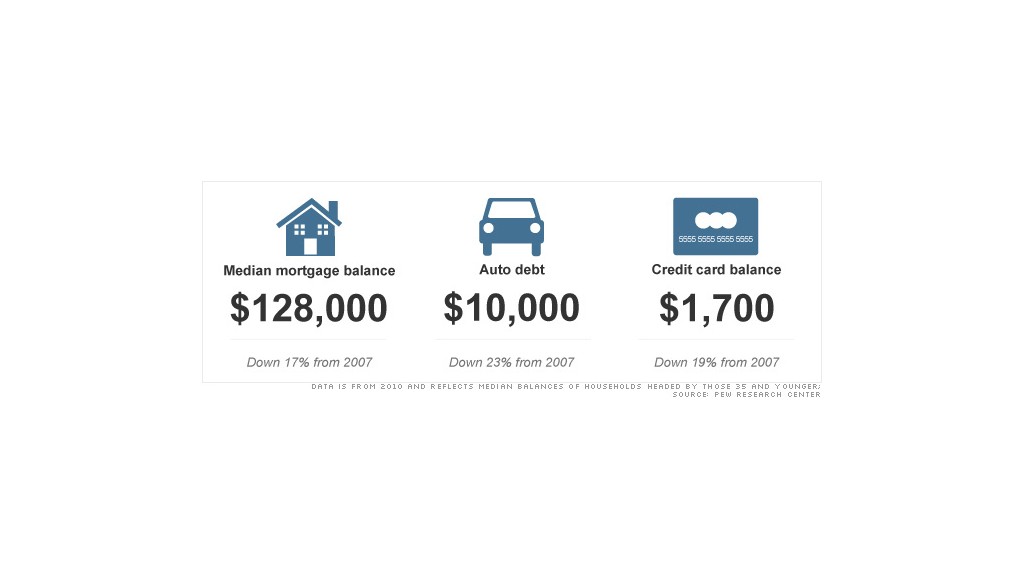
Young adults are in less debt than they were a decade ago, but that's not a good thing.
It's not because legions of Americans under age 35 have suddenly become fiscally responsible. It's more likely that their shaky economic foundations either prevent them from qualifying for a loan or even thinking about applying for one, according to those studying the trend.
"It's a sign of economic struggle, not economic success," said Richard Fry, senior economist at the Pew Research Center. "They don't have the mortgage, but they don't have the house."
The center found that young adults' debt levels dropped nearly 14% between 2001 and 2010, while rising 63% for those age 35 and older, according to a recent Pew study.
The real-world ramifications are eye-popping. The share of younger households owning their primary residence fell to 34% in 2011, down from 40% in 2007. Only 66% owned or leased at least one vehicle in 2011, down from 73% four years earlier, as car loans plunged. Credit card balances have also fallen.
The only debt on the rise is student loans. In 2007, just over a third of young households had outstanding student debt. That jumped to 40% in 2010.
One reason for the decline is the weak job market, especially for the young. Their unemployment rate was more than 2 percentage points higher than their older peers in 2010 and 2011, according to federal labor statistics. Many of those lucky enough to have employment either make less than they expected or are concerned about getting laid off.
"Young people have less debt because they are less likely to live the American Dream -- own a home, buy a car, start a family," said Evan Feinberg, president of Generation Opportunity, an advocacy organization for young adults. "If they don't have a job, they can't even think about getting a car loan."
Take Vincent Nitopi of Alexandria, Va. Nitopi, 31, and his wife were hoping to buy a house last year, but the only mortgage they could secure carried too high an interest rate.
Though the couple want to own a home one day, they've postponed that goal for now. Nitopi is in the military, but he's concerned he could be the victim of a downsizing. So he now prefers to put any extra funds they have toward building a financial cushion.
"Picking up a couple of hundred thousand dollars in debt has put us off," he said about the idea of taking on a mortgage. "Renting is just fine."
Related: Americans still aren't saving enough
Brian Hackett, on the other hand, thought he'd be a homeowner by now. Instead, the 25-year-old is living with his parents and looking for full-time work after being let go recently from a part-time job.
Hackett graduated from The College of New Jersey magna cum laude in 2010. A thorough planner, he opted not to room at college in his last two years and to forgo graduate school to keep his student loan burden down. He hoped to launch a career in public policy or government as soon as he graduated so he could save for a down payment.
The lousy job market thwarted those plans. Now, he's not sure he'll be a homeowner by the time he turns 30.
"At this point, I don't think that will be possible," said Hackett, who applies for 10 jobs a week and was recently told he was overqualified. "I'm three years behind."

Young adults are pulling back on credit-card debt for similar reasons, said Amy Traub, a senior policy analyst at Demos, a public policy research organization. It found that Americans age 25 to 34 cut their credit card debt in half between 2008 and 2012.
All around them, young adults are seeing signs of financial distress -- job insecurity, foreclosures, high college costs. That's making them think twice about applying for loans, she said.
"Young people are being cautious in this difficult economic time," Traub said. "They are reluctant to take on debt."


